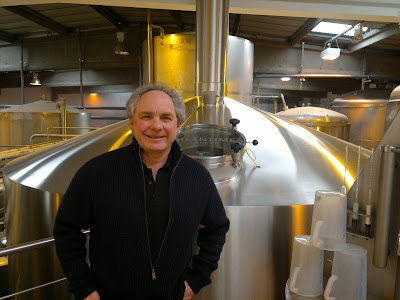Lager is more commonly associated with the words 'lout' and 'binge' than 'gastronomy', but that's set to change as an ever increasing number of UK breweries turn their attention to a drink that requires a high level of technical skill to make and when brewed correctly can be as nuanced as a fine wine.
The nationwide trend spreads from West in Glasgow and Harviestoun in Clackmannanshire in Scotland, to Hawkshead in the Lake District, Freedom in Staffordshire, the Cotswolds Brewing Company in Burton on the Water and the St Austell Brewery in Cornwall. They even brew the stuff in the Channel Islands at Randsalls of Guernsey.
'The idea that the British can't produce lagers is rubbish and we're determined to make people understand that its how you make beer that makes it special not where you make it,' says brewer Paddy Johnson of Windsor and Eton Brewery who began production of the highly acclaimed Pilsner-style Republika lager last summer.
 Meantime brewer Alastair Hook
Meantime brewer Alastair Hook But according to Meantime Brewery's Alastair Hook (the godfather of British lager who has opened 13 microbreweries since 1989 including Freedom in Fulham and Mash with Oliver Peyton) there's a historical reason why we've been slow to produce our own version one of the UK's most popular alcoholic drinks.
'Lager means to store, its a German verb. That means low temperatures of fermentation and low temperatures of maturation over a long time period,' explains Hook. 'The British brewing industry has always geared to warm temperature fermentation and short periods to make beer, typically seven to ten days, and the two couldn't meet.'
Although brewed from simple ingredients-just malted barley, hops, softened water and special lager yeast that thrives at low temperatures-the equipment and time required (Republika for example takes two months) make it a seriously expensive proposition.
'For a craft brewery to produce 10,000 barrels of beer would cost you £150k; to produce 10,000 barrels of lager would cost a £1million,' says Hook, as he tours me round Meantime's £5million brewery on a south London industrial estate that's currently being expanded to meet demand. 'You need large tanks and very high quality process control. You need fermentation vessels that are clad and temperature controlled and pressurised so the natural carbonation doesn't escape.'
But for those brave enough to take the plunge, the potential rewards are high. Hook estimates that the market for craft brewed lager in London alone is 40-50,000 hectolitres and in the 10 months since its launch, Hook and his team have brewed 10,000 hectolitres (about 1.7million pints) of Meantime London Lager that's made with East Anglian malted barley and Fuggles and Golden hops from Kent which he says gives the beer an 'earthy, orangey character'.
At the state of the art Camden Town Brewery under the Camden line railway arches in north London, Jasper Cuppaidge is using European influences to produce something distinctly British, even if he is Australian.
'We took our two favourite styles which are German Helles and Czech Pilsner and made a hybrid for London drinker. Pilsner's very hoppy but the body's very light and the Helles is very big bodied but very light in hop. We wanted the body of a Pilsner and the hop profile of a Helles to give a really refreshing light drinking lager,' says Cuppaidge, who has gone to extreme lengths to perfect the brew.
'Mashing is the first part of the process - soaking the malted grains with water that's heated from 40°C to 70°C to remove the sugar and colour extract to make the wort that's fermented to become the lager. We had eight steps in our original mashing programme and now we've only got seven. That's a result of little tinkerings of point two and three of a degree which might sound really weird but you can taste the difference.'
For Charlie McVeigh, who serves Camden Town Lager at his Draft House pubs in London, how the beer is served is just as important as how its made. 'If the glassware is not right, if its greasy or dirty, the lager will have a thin head. We use a special chemical in our glasswashers that removes all the grease and allows the head to form properly,' says McVeigh.
Increasingly, craft British lager is peaking the interest of chefs, who are matching the beer with their food. At Galvin at Windows on Park Lane, Andre Garret is pairing mussels and smoked haddock, deep fried organic egg, sour dough and sauce mariniere with Camden Hells Lager as part of his British Beer Fest menu (running from 23rd April until 7th May).
When Quilon re-opens later this month following a refurbishment, chef Sriram Aylur will be offering a British lager list, served in Champagne flutes or wine glasses to accentuate their individual flavours, to compliment his subtly spiced Michelin-starred food that's based on the cuisine of the south west coast of India.
'Lager is as good a match for my food as wine, if not better,' says Aylur who was named Beer Drinker of the Year in 2011. 'We serve Ceilidh as our first drink with papads and chutneys and Brew Dog to accompany a nice subtle lamb biryani. Meantime London lager is perfect with black cod baked with tamarind, jaggery chilli fenugreek.'
A shorter version of this article appeared in the
Metro


